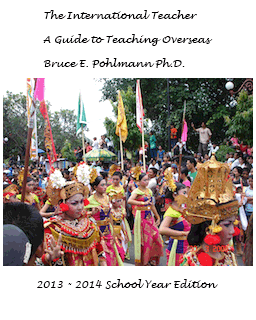Welcome to the Teaching Overseas page
My first teaching position was as a Teaching Assistant in the Department of Anthropology at the University of Illinois, Chicago, in 1978 while I was working on my Master's in Anthropology. A few years later I was a teaching associate in the Department of Anthropology at the University of California, Berkeley. I eventually received a Ph.D. in anthropology from Cal specializing in cross-cultural education.
Instead of becoming a professional anthropologist, I entered California State, Hayward, and received a teaching credential. My first job was teaching sixth grade in Rancho School in Novato, California. I spent two educational years at Rancho learning about how to teach children. It was a tremendous difference from my experiences teaching anthropology to undergraduates - much closer to my four months of substitute teaching in Orleans, California while I was doing fieldwork for my Ph.D.
While I was at Rancho, I decided to try to get a job overseas so that I could be with my wife who was finishing up her Ph.D. at Stanford, and who was planning on working in India. I found out about ISS (International Schools Services) and went to my first, and only, international job fair. The experience was somewhat discouraging - I ended up with only three interviews and no job offers. I went back to Rancho planning on spending another year there, but just as my marriage was ending, ISS offered me a job in one of their schools in Indonesia.
The International School of Tembagapura was a small school of 65 students in a remote location in the mountains of Irian Jaya. Irian was one of the provinces of Indonesia. It's half of the island of New Guinea; the rest of the island is the country of Papua New Guinea. I planned on spending a year or two in Tembagapura and then return to San Francisco. The few years became 9 during which time I taught second grade, computers for the whole school, middle school math, and algebra. During my years in Tembagapura, I returned to the States for a few summers to pick up an administrative credential from Washington State University, Pullman.
While I was working in Tembagapura, the mining company that I worked for built a town, Kuala Kencana, to serve as their administrative center in the lowlands of Irian about a two hour drive down the mountain from Tembagapura. I moved down to Kuala Kencana as the school principal as well as teaching computers, physical education and middle school math. After two years in Kuala Kencana, I decided to retire.
My family and I returned to Bali where my wife was born. I worked as the editor for an online webzine, Iteachnet.com for a few months, and when I was asked to come work in Pakistan teaching computers and anthropology, as well as serving as the computer coordinator, I took the position even though it meant leaving my wife and children in Bali.
I spent four years at Lahore American School teaching computers, high school anthropology, middle school math and eventually serving as the elementary/middle school principal. My years at LAS coincided with the events of 9/11 and the war in Afghanistan and then Iraq. Our school was badly affected by all of these events and the student population decreased from 425 students to less than 200. A large part of our foreign hire staff were released. Our student numbers increased to around 300, but the school eliminated one of its administrative positions, and I took a position teaching computers and middle school math (again) at the Batu Hijau International School in Sumbawa, Indonesia. Once again, I am working for a mining company (gold and copper) in a somewhat remote (but beautiful) location outside of the normal tourist areas of Indonesia.
So with my history overseas out of the way, on to a discussion of some of the issues with teaching overseas. Questions about teaching overseas usually revolve around these general questions:
- How do you go about getting a job teaching overseas?
- How much do overseas' jobs pay?
- Are there positions in developed countries or only in remote or "dangerous" locations?
- What is it like teaching overseas?
Go to the Teaching FAQ page for my answers to these questions.

